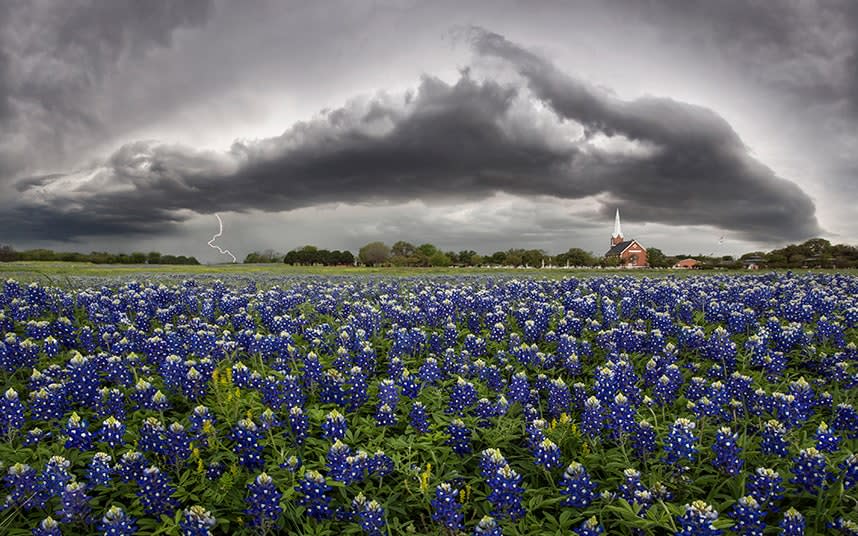Everything you need to know about storm chasing holidays

Storm chasing might seem like an activity reserved for the brave and/or foolish. But there are several travel firms offering tours that aim to take ordinary travellers into the thick of the action. Here's how to plan and what to expect on a storm chasing holiday.
Where to go
While some organised storm chasing takes place in Australia, it is a large swathe of the American Midwest, known as Tornado Alley, that attracts the vast majority of enthusiasts. The area includes Oklahoma, Texas, Kansas, Nebraska, and parts of Colorado, Wyoming, Arkansas, Missouri, Iowa, New Mexico and South Dakota.
Tornadoes are common in the region as it is where cold dry air from Canada and the Rockies meets warm, moist air from the Gulf of Mexico and hot, dry air from the Sonoran Desert. The combination causes atmospheric instability and intense weather events.

When to travel
The peak season for storm chasing in Tornado Alley is May and June, but some companies also operate tours in April, July and August.
How to do it
Storm chasing involves a lot of research and preparation, and even then it's not guaranteed you'll have a successful outing. An array of equipment and expertise is required to pinpoint the most likely locations for extreme weather, so DIY storm chasing isn't really an option for most.

Patience is essential
You'll need to be prepared for long days and frustration - in reality, the chances of seeing a tornado, even with all that equipment, are slim, and most tornadoes are quite weak and touch down for only a minute or two. But it's virtually guaranteed you'll see supercell storms, which are almost as impressive.
Living out of a suitcase is the order of the day
Expect early mornings, lots of fuel stops, lunches on the run, and hundreds of miles spent on the road every day. Be ready to spend a lot of time making conversation with your fellow storm chasers - finger's crossed you get a good group.

Most operators will organise accommodation, transport, guides, and drivers. Flights, and usually meals, are extra. Pack a camera, clothing for a variety of weather. Tours usually last between one week and 10 days.
A typical chase day
A tour with Storm Chasing Adventure Tours, for example, involves the following: "Each morning we will analyse weather data to forecast the best severe weather target area for the day, [before] discussing the forecast with our guests. We refine the target area as the day goes on with any new information from our mobile internet system as we drive to the target area. Due to prime storm chasing time being in the late afternoon and early evening hours, we try to find a locally popular restaurant for lunch, which may become our main meal of the day.

“By 4pm to 6pm we want to be in the vicinity of the severe weather target area. Since we may be in very rural areas for the afternoon and evening storm chases, stopping for dinner might not be possible until 9pm or later. Each tour experiences supercell thunderstorms and lightning shows at night. We cannot guarantee that you will see a tornado because they happen on 25 to 30 per cent of tours, but we can say that you will have a great experience seeing great storm structure and the beautiful scenery of the Plains. We will travel as far as necessary to have the best chance for tornado viewing."
Non-chase days may occur
...usually following a major weather event, when there are simply no storms to track down. You may be taken to other tourist sites en route, such as National Parks, beauty spots, and quirkier attractions, such as the Little House on the Prairie near Independence, Kansas, and Dorothy’s House and the Yellow Brick Road at Liberal.

Tour operators
UK firm Weather Holidays currently has a few spaces left for tours from June 12 to June 23 and from June 23 to July 4 (both departing from Denver). Tours cost from £1,450, including shared accommodation (single rooms cost £495 extra), travel in the chase area and the services of a driver, guide and forecaster. Flights and meals are extra. See weatherholidays.com.
Cloud 9 Tours claims to be the oldest storm chasing tour company still operating. It has a few spots remaining for tours beginning on May 26, while bookings are already being taken for next year. Its tours cost from $2,450 (£1,795) per person. They start and finish in Oklahoma City, where clients are met at the airport. See cloud9tours.com.

Storm Chasing Adventure Tours currently has only two spaces left for its 2018 itineraries. But bookings for 2019 are available, with a selection of dates in April, May and June. Starting points are Denver or Oklahoma. Fees are from $2,100 (£1,539). See stormchasing.com.
Silver Lining Tours offerings for 2018 have sold out. Bookings for next year are open, with various departures between April and June, starting in Oklahoma, Denver and Rapid City, South Dakota, respectively. Prices are from $1,500 (£1,099). See silverliningtours.com.
Extreme Tornado Tours has availability on seven-day and 10-day tours departing on May 8, May 21, June 3 and June 12 from Denver and Oklahoma. Prices are from $2,700 (£1,978). See extremetornadotours.com.
